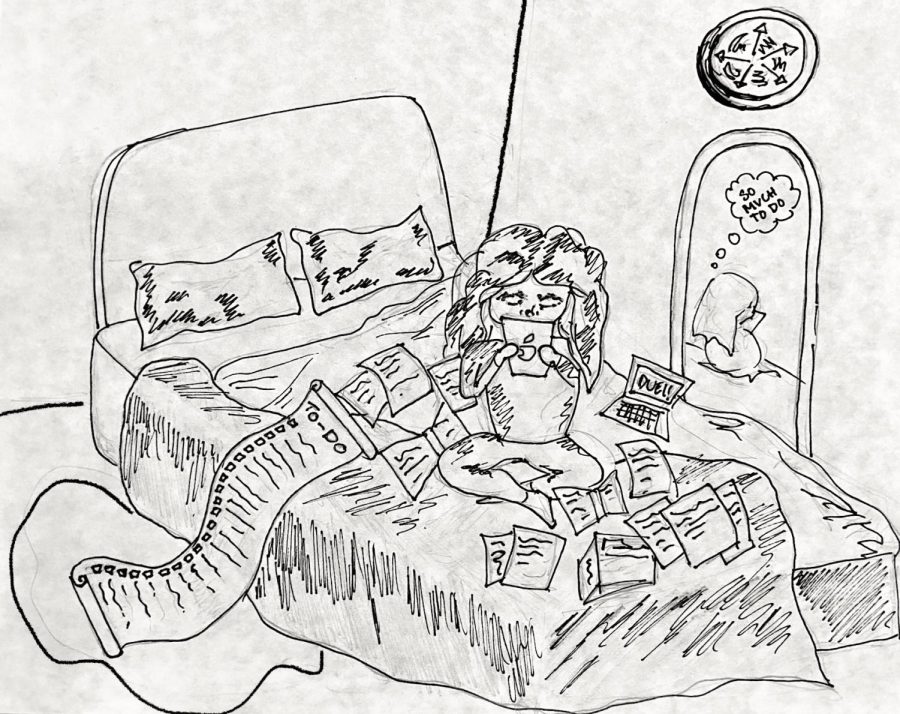Society normalized a new style of living for teenagers in the past decade; a heightened emphasis on competition and excellence is now expected from all teens to ensure a successful future.
This includes striving for the best in all aspects of life – academics, sports, arts and more. Teens must go above and beyond all peers, instilling unbearably high standards of success and levels of stress. But this generational determination comes with a generational sense of procrastination and hyperfixation.
In a world full of constant distraction at the touch of a fingertip, how are teens expected to meet the demands of competition and tenacity without faltering?
The biggest distraction and threat to the definition of success spread today, an idea of utmost, categorical excellence, is an innate feature of society itself: the technology era. This era, particularly the age of the smart phone and internet, has altered human patterns of life so invasively, that daily functions any teen might normally conduct become arduous.
The smartphone allows individuals to access information in a matter of seconds. It allows social connections and reprieves of entertainment. Smartphones seem to be a beneficial tool for academic development among teens, yet they arguably hinder productivity and high-functioning brain activity.
Why are teens sucked into a pattern of phone addiction so familiar to all high schoolers, rather than using this tool for fruitful purposes? This question eludes the hopeless consumer of media because of the normal perceptions of phones: they are seen as tools exuding knowledge rather than oracles of expeditious content generation.
Phones, and the internet as a whole, provide rapid content in an attractive way, meant to stimulate the brain or evoke emotion or provide pleasure. The nature of content, all backed by predictive algorithms, literally works to generate the most appealing response from the consumer of media. With portable devices in everyone’s hand and content generation becoming profitable for all, teens cannot escape the enticing and omnipresent nature of rapid content.
That frequent happy response from a relatable article or a text from a friend or a comment on Instagram activates a tiny dopamine release in the brain. Dopamine is the pleasure chemical, released when some survival instinct is met, such as eating, laughing or having sex.
Phone activity, specifically any interaction that releases a happy little feeling in the brain, generates a greater release of dopamine. The brain naturally craves this easy, constant, short-term release of dopamine. Once phone-usage equals dopamine-release, the brain starts to crave the smartphone, fueling an addiction.
The cycle of habitually picking up the phone, releasing dopamine, feeling pleasure, then crashing becomes vicious and endless. Symptomatology can be used to classify this phone dependency as an addiction. Some symptoms include loss of control (a distortion of time spent on the phone), preoccupation and even withdrawal symptoms associated with increased phone usage.
Further side effects include unbearable pressure, procrastination and dependency. The internet age has been a primary inhibitor for countless teens attempting to tap into deeper levels of focus and hard work. The tech addition makes the relinquishing of phones seem unbearable, severely impeding necessary skills to reach the new level of competition established by society.
Junior Aarya Joshi related to this phone addiction so common among today’s youth. “Having my phone just in my presence makes it harder to finish one thing within a certain period of time. Close proximity of my phone just makes me want to check it every two seconds and clear the notifications,” she stated.
“I feel like having my phone on me all the time makes me really dependent on it. The constant feeling of addiction makes me feel really helpless when I try to get work done.”
The tech addiction primarily prevents the establishment of “flow.” Flow is a complete state of focus and resolve in which space, time and any external distractions pose no obstacle in the grand scheme of productivity. When pages and pages of an essay fly out of the keyboard, or numbers and postulates race down a math problem with no hesitation or external motivations, flow is achieved. This state is particularly important for students as they experience unmatched productivity and peak learning.
But smartphones disrupt the necessary process of getting into “flow.” Flow requires an equal pairing of difficulty of the task and competence of the doer but, most importantly, requires several uninterrupted minutes or hours of acute concentration. Even brief interruptions, a quick check on socials or a short reply to a friend, disrupt the establishment of flow. Smartphones, with their frequent acoustic and visual notifications, distract well-intentioned doers from ever achieving flow. Many students even develop a “checking-habit.’‘ The dopamine release no longer comes naturally, so users start actively searching for a hit, which also renders any establishment of flow impossible.
Junior Kenzie Ruge admitted to feeling symptoms of internet addiction. “I have had to set my phone across the room just to get my homework done yet sometimes I still find myself checking it,” she stated. “It has been so long since I have achieved an adequate sense of “flow” and I would credit that entirely to the distractions provided by my phone.”
As teens enter a crucial stage of hard work and competition in their lives, they must add the additional challenge of sobering up from tech addiction. Life becomes more demanding by the day, standards rise, work loads pile up and everyone strives to find that cutting edge to become the best. A constant phone dependency could be the barrier between various degrees of success. Though overcoming tech addiction seems nonviable, “my phone is just so enticing”, methods to practice delayed gratification and avoid idle moments will ease the withdrawal.
Teens – no matter how pressing that notification seems or however mildly entertaining that video is – do not allow tech addiction to inhibit success and progress.









